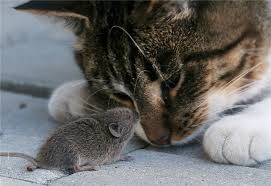Potent cocktail: Has this cat been manipulating mice with its urine?
Cat v mouse: it is probably the most famous predator-prey pairing, enshrined in idioms and a well-known cartoon.
And cats, it turns out, even have chemical warfare in their anti-mouse arsenal – contained in their urine.
Researchers found that when very young mice were exposed to a chemical in cat urine, they were less likely to avoid the scent of cats later in life.
The researchers had previously found that the compound – aptly named felinine – causes pregnant mice to abort.
Dr Vera Voznessenskaya explained that mice have a physiological response to this cat-specific compound.
Chemical-sensing mouse neurons in the mouse’s brain pick up the scent, triggering a reaction which includes an increase in the levels of stress hormones.
“It’s something that has existed in cats and mice for thousands of years,” said Dr Voznessenskaya.
This new study revealed that baby mice exposed to the compound during a “critical period” in their development would, as adults, react quite differently to their arch enemy’s smell.
The team exposed one-month-old mice to the chemical over two weeks. When they were tested later for their reaction, they were much less likely to flee the same scent.
The interaction between cats and mice has a long history
“Their physical sensitivity [to the chemical] was actually actually much higher,” Dr Voznessenskaya explained. “More of their receptors detect the compound and they produce higher levels of stress hormone.”
Despite this though, mice raised around the unmistakable scent of cat pee are less inclined to show signs of fear, or to flee when they sniff it out.
“You get a higher response, but less behaviour,” said Dr Voznessenskaya, “and habituating like this is probably useful for the mice; they can’t run away, because they need to live around humans and food. And cats [also] live around humans.”
As for the cats: “They seem to be able to keep the number of mice around that they need,” she added.
Source: BBC
N.H.Khider

